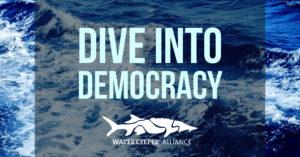
There are costs and benefits to every action taken by the government. For example, when the U.S. Environmental Protection Agency (EPA) makes a new rule setting limits on pollution, there is a good chance that, in addition to benefits such as improved health for the public and better quality of life, there are also costs associated with controlling the release of pollutants. When polluters talk about “overly burdensome” or “job-killing” environmental regulation, what they are really saying is that they do not want to pay to stop or control the release of pollutants.
EPA is currently accepting comments on how it should consider costs and benefits in the rulemaking process. Please submit your own comment before Monday, August 13 to ask EPA to properly consider the public benefits of clean water and air. Find a comment template below.
It can be difficult to fully account for all the benefits that pollution reduction brings to the public – for example, how do you put an accurate dollar value on knowing that your grandkids will also be able to fish in a nearby creek, or the benefit of a community knowing it is is safe to swim in a local swimming hole? This means that when decisions are made based entirely on known monetary costs and benefits, often polluters have the upper hand. Despite this, studies show that the calculated benefits of EPA regulations far outweigh the costs.
Sometimes the public need for protection against dangerous pollutants is so great that it would be unreasonable to balance the costs and benefits. Congress understood this when writing our bedrock environmental laws, such as the Clean Water Act and Clean Air Act. For example, some air quality protections are required to be as stringent as necessary to protect human health, regardless of the cost. The Clean Water Act was carefully designed to allow some costs to be factored into pollution limits based on available technology, but not for limits based on water quality.
The Trump administration, in an effort to save polluters money, wants EPA to give greater consideration to the costs of industry regulations than to the public benefits of controlling pollution. To this end, EPA is currently soliciting comments on how it should consider costs and benefits in the rulemaking process, under the guise of “improved consistency and transparency.” The comment period is open until August 13, 2018. If allowed to go forward, this could result in important public health and environmental protections getting eliminated or sidelined by EPA based on the argument that the costs to polluters would be simply too high.
Please submit your own comment this week to stand up for EPA properly considering all benefits of rulemaking and following existing legal requirements for doing cost/benefit evaluations. Here is a template to get you started; please personalize it with some examples of benefits you enjoy from environmental protections!
I am writing to voice my opposition to any proposal by EPA to promulgate regulations that purport to provide a consistency and transparency related to how EPA weighs the costs and benefits of regulation. I am opposed to this because it is a blatant effort to tip the scales in favor of weighing the costs to industry more heavily. It also contradicts the statutory requirements of environmental laws that carefully specify when and how cost and benefits should be weighed.
The benefits of environmental protection are often difficult to fully account for in monetary terms. Despite this, EPA regulations have consistently been shown to deliver far greater economic and other benefits than the costs imposed on industry. EPA’s current efforts to revise how it calculates costs and benefits show an intent to “cook the books” in industry’s favor and could prevent the creation of important public protections.
Furthermore, any action taken to alter how EPA balances costs and benefits would directly contradict federal law. The requirements for EPA to engage in cost-benefit analysis varies based on the standards set forth in environmental laws. EPA cannot create regulations that contravene these carefully crafted requirements.
Sincerely,
[YOUR NAME]
 Dive Into Democracy is Waterkeeper Alliance’s weekly roundup of current attacks on America’s clean water protections and how to take action. Want to get them in your email? Sign up here.
Dive Into Democracy is Waterkeeper Alliance’s weekly roundup of current attacks on America’s clean water protections and how to take action. Want to get them in your email? Sign up here.
**Feature image by Kelly Sikkema on Unsplash